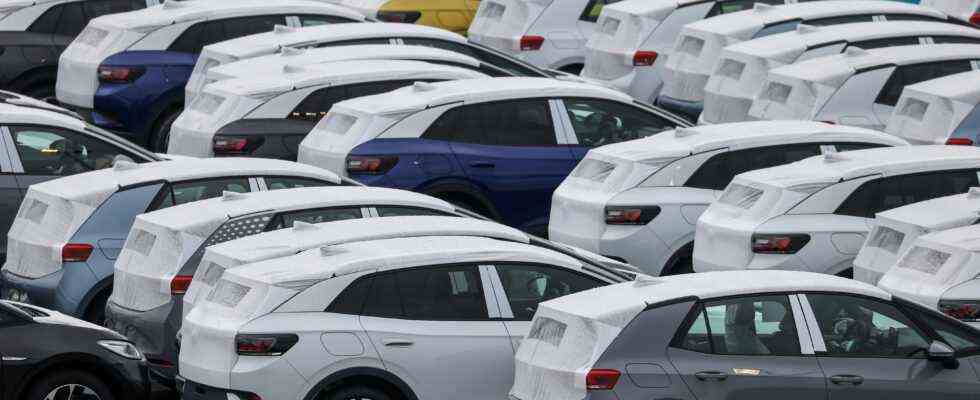Status: 07/14/2021 4:05 p.m.
“Fit for 55” – with this concept the EU wants to bring the economy on a climate course. From 2035 onwards, no new combustion engines are to be approved. Stricter regulations are also expected to apply to air traffic.
The EU Commission has presented a comprehensive climate protection program. With “Fit for 55”, the EU wants to save at least 55 percent of CO2 emissions by 2030 compared to 1990 levels. By 2050, practically no more CO2 should be emitted. In addition to new tariffs, taxes and targets, the climate package also provides for the de facto end of the internal combustion engine.
The EU Commission wants that conventional gasoline and diesel cars will no longer be registered in Europe by the middle of the next decade at the latest. The proposal presented envisages that from 2035 only emission-free new vehicles should be registered in the EU.
However, there should be a review clause. Accordingly, every two years it should be analyzed how far the manufacturers are; A major test report is to follow in 2028. In theory, the date 2035 could still be postponed. The EU countries and the EU Parliament still have to approve the proposal.
The Commission proposal also provides that by 2030, greenhouse gas emissions from new cars should be reduced by 55 percent compared to 2021. If manufacturers do not adhere to the specifications, penalties should be paid. The project is part of the Commission’s plans to implement the more stringent climate targets in Europe.
Radical CO2 reduction, climate-neutral by 2050: EU commission presents legislative proposals
Bettina Scharkus, ARD Brussels, daily news 3 p.m., July 14, 2021
More charging points for e-cars on major roads
For the transformation in the transport sector, charging points for electric cars are to be set up every 60 kilometers on major highways in the EU. The Commission estimates the investment costs for the charging infrastructure at a total of 15 billion euros.
Hydrogen filling stations are to be built every 150 kilometers. The EU Commission also said that even if you are currently assuming a poor energy mix, an electric car has lower emissions than a classic combustion engine.
Kerosene tax for intra-European flights is to come
In addition, the EU Commission wants to introduce a kerosene tax for flights within Europe. The existing exemption of the aviation industry from the fuel tax is to be gradually softened over ten years, said the Brussels authority. Private business flights and freight traffic should therefore continue to be exempt from taxation.
Proponents of a kerosene tax consider it necessary to make flying more expensive, especially on short routes, for reasons of climate protection. In the aviation industry, however, a kerosene tax has met with criticism – in particular, international competitive disadvantages are feared. The industry sees the greatest leverage in climate protection in the development of alternative fuels.
Import tax on climate-damaging products not until 2026
The EU Commission is not aiming to introduce an import tax on climate-damaging products from third countries until 2026. From 2023 onwards, a transition phase is planned so that companies can adapt to the change, said the Brussels authority.
Subsequently, importers of steel, aluminum, cement and fertilizers will have to buy CO2 certificates based on the climate-damaging nature of their imports. The so-called CO2 border adjustment mechanism is intended to encourage third countries to make their industries more climate-friendly. In addition, this should prevent a migration of CO2-intensive branches of industry.
“CO2 emissions must have a price,” said EU Commission President Ursula von der Leyen. The idea of a CO2 border tax was proposed last year, among other things, to finance the EU’s Corona reconstruction fund and basically received the blessing of the heads of state and government. Originally, it was intended to be introduced in 2023.
Schulze: Germany well prepared
Federal Environment Minister Svenja Schulze sees Germany as well prepared for the upcoming debates. The new requirements from Brussels are already largely included in the new climate protection law. “The German government will now examine the proposals of the EU Commission thoroughly, but also quickly and constructively. There will certainly be intensive negotiations, and we will make our contribution to achieving an ambitious, fair and solidarity-based agreement,” says Schulze.
Greenpeace criticizes the EU’s climate targets as too low. This will not stop the destruction of the planet, says EU Director Jorgo Riss. Many measures would not take effect for at least ten years, such as the phasing out of internal combustion engines from 2035.
EU Commission’s climate package: Zero traffic emissions by 2035
Jakob Mayr, ARD Brussels, July 14th, 2021 4:29 p.m.

